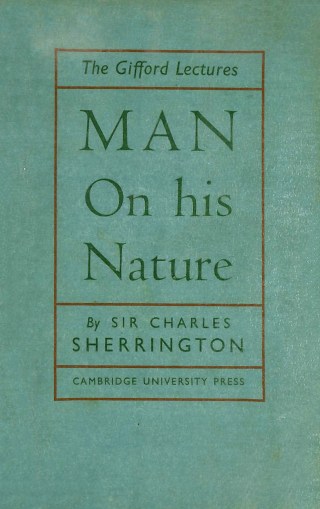A Responsibility to Wonder: Pioneering Neuroscientist Charles Scott Sherrington on the Spirituality of Nature
By Maria Popova
To be fully awake to life is a matter of ceaselessly digging for that “submerged sunrise of wonder” — a matter of living, in the astronomer-poet Rebecca Elson’s immortal words, with “a responsibility to awe.” Out of that responsibility arises a kind of quietly rapturous spirituality — a way of moving through the world wonder-smitten by reality.
The great English neurophysiologist Charles Scott Sherrington (November 27, 1857–March 4, 1952), laureate of the 1932 Nobel Prize for his groundbreaking discoveries of the function of neurons, termed this orientation “Natural Religion” and explored its rewards in his 1937 Gifford Lectures, later published as Man on His Nature (public library | public domain) — a book composed in the epoch when every woman was a “man,” yet replete with dazzling universal wisdom on our human experience of being material creatures moving through a cold cosmos as living hearths of consciousness.

Sherrington’s Natural Religion is rooted in Natural Science — in the living reality of this world, governed by the fundamental laws of the universe. Tracing the astonishing process by which we came to be — primordial matter becoming atoms becoming living cells becoming bodies crowned with minds — he writes:
We dismiss wonder commonly with childhood. Much later, when life’s pace has slackened, wonder may return. The mind then may find so much inviting wonder the whole world becomes wonderful. Then one thing is scarcely more wonderful than is another. But, greatest wonder, our wonder soon lapses. A rainbow every morning who would pause to look at? The wonderful which comes often or is plentifully about us is soon taken for granted. That is practical enough. It allows us to get on with life. But it may stultify if it cannot on occasion be thrown off. To recapture now and then childhood’s wonder, is to secure a driving force for occasional grown-up thoughts.

Wonder, Sherrington argues, is the appropriate mood with which to approach the workings of our improbable planet and their echo in the workings of the exquisite cathedral of chemistry and chance that is a human being. That is where traditional religions have both thrived and fallen short, emotionally compelling in their humanistic self-reference, yet limiting of wonder, which has to do with what lies beyond ourselves:
Anthropomorphism is perforce charged with the human and the personal, and the great historical religions are frankly anthropomorphic. Anthropomorphism with its lien on the personal is always quick with emotion… Commonly the human is the strongest source of emotive appeal to human kind. Human doings, human feelings, human hopes and fears move man as does nothing which is not human. The great religions as part of their anthropomorphism cultivate the Deity as a personal Deity. That for their followers forms an element fraught with emotional drive of power, for some minds, elsewise unattainable… This source of emotional strength Natural Religion is without, for it sublimes personal Deity to Deity wholly impersonal.

With an eye to the “sacred curiosity” that is the hallmark of human consciousness, Sherrington mounts a defense of the emotional dimension of a spirituality grounded in science:
Surely Truth, Beauty, Charity provide passion… Natural Religion has not forgone emotion. It has simply taken for itself new ground of emotion, under impulsion from and in sacrifice to that one of its values Truth. Its view of the world and of itself is based upon the purview of what by its lights it can accept as true. In that way, for it, much that is comfortable in other religions lapses. If you will, man’s situation is left bleaker. One feature of that situation is that the human mind, such as it is, is left the crown of mind to which human life in all its needs has direct access. Compared with a situation where the human mind beset with its perplexities had higher mind and higher personality than itself to lean on and to seek counsel from, this other situation where it has no appeal and no resort for help to beyond itself, has, we may think, an element of enhanced tragedy and pathos. To set against that, it is a situation which transforms the human spirit’s task, almost beyond recognition, to one of loftier responsibility. It elevates that spirit to the position of protagonist of a virility and dignity which otherwise the human figure could not possess. It raises the lowliest human being conjointly with the highest, Prometheus-like, to a rank of obligation and pathos which neither Moses in his law-giving nor Job in all his suffering could present. We have, because human, an inalienable prerogative of responsibility which we cannot devolve, no, not as once was thought, even upon the stars. We can share it only with each other.
Complement with quantum pioneer Erwin Schrödinger, who was inspired by Sherrington, on mind and matter and the great Lewis Thomas on the miraculous in a material world, then revisit Rachel Carson, writing the year Sherrington returned his borrowed stardust to the universe, on the sense of wonder as the antidote to self-destruction.
—
Published January 12, 2023
—
https://www.themarginalian.org/2023/01/12/charles-scott-sherrington-man-on-his-nature/
—





ABOUT
CONTACT
SUPPORT
SUBSCRIBE
Newsletter
RSS
CONNECT
Facebook
Twitter
Instagram
Tumblr